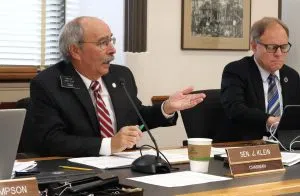
Sen. Jerry Klein, R-Fessenden, chair of the Legislative Procedure and Arrangements Committee, speaks during a meeting on March 20, 2024, next to House Majority Leader Mike Lefor, R-Dickinson. (Michael Achterling/North Dakota Monitor)
(Mary Steurer – North Dakota Monitor) – North Dakota legislative committees approved changes to their conflict of interest rules on Monday that aim to make the process easier for lawmakers to understand and to address concerns about transparency.
The proposed amendments will undergo further discussion Tuesday, and go before the floors of the House and Senate on Wednesday morning for final approval.
During previous legislative sessions, when a lawmaker declared a conflict of interest on a bill, it was up to the other lawmakers present for the vote to decide whether to excuse that member from voting.
But the House and Senate rules didn’t provide much guidance for how the other lawmakers should weigh their decision.
The rules stated that the rest of the assembly should only excuse that lawmaker if the conflict affects the member “directly, individually, uniquely, and substantially,” but did not define these criteria.
“Members have expressed confusion regarding the meaning of these terms when determining whether a conflict exists,” Legislative Council attorney Liz Fordahl told the Senate Rules Committee on Monday afternoon.
Lawmakers were not required to provide details about their potential conflict, and the votes were decided without debate.
In practice, lawmakers interpreted the disclosure requirement very narrowly. In 2023, members raised potential conflicts of interest on bills three times, according to the Legislature’s website. In each case, the lawmakers were still allowed to vote.
The proposed amendments seek to address several of these gaps. Emily Thompson, legal division director for the Legislative Council, said the changes were crafted after discussions with the Ethics Commission and after the Legislative Procedure and Arrangements Committee had finished its business during the interim.
First, any lawmaker who declares a conflict would have to provide enough information about their situation so that the other members who are present could make an informed decision about whether that lawmaker should be allowed to vote.
The other members would also be allowed to debate the issue amongst themselves.
Additionally, the new rules make it clear that, even if the rest of the chamber gives them the green light to participate, a lawmaker may abstain from voting on a bill if they believe they have a serious conflict.
In the past, it’s been extremely rare for a North Dakota lawmaker to abstain from voting on a bill, even if they disclose a personal benefit. For example, the late Sen. Lonnie Laffen of Grand Forks declared a conflict in 2013 over a North Dakota University System budget bill that included funding for his architecture firm for a building renovation. His colleagues declined to excuse him from voting.
Another significant change is that the new rules do not require a conflict of interest to affect a lawmaker “substantially.” The North Dakota Supreme Court found in a 1968 decision that all conflicts of interest between a lawmaker and the state government must be disclosed regardless of whether that interest is big or small, Fordahl noted.
The proposed changes would include the following definitions for the remaining criteria:
- “Directly” is defined as “immediately or without additional intervening action or decision.”
- “Individually” is defined as “for a reason other than belonging to a group, including as a member of a profession, occupation, industry, region, or the general public.”
- “Uniquely” means “in a way that is distinct from the general public.”
Both draft amendments also provide a grace period to lawmakers who inadvertently fail to disclose conflicts. The House version states the member can disclose the conflict to the speaker of the House up to 21 days “after the conflict arises,” whereas the Senate version states the member can disclose the conflict to the president of the Senate within 21 days after the legislative session ends.
Thompson said sometimes, especially toward the end of the session, lawmakers are responsible for sifting through hundreds of pages of bills. They may not always realize in the moment that they have a conflict.
Some members of the Senate Rules Committee raised concerns that debating every potential conflict of interest could take awhile.
To save time, Assistant Senate Majority Leader Jerry Klein encouraged lawmakers to consult legislative leadership or Ethics Commission staff about potential conflicts of interest.
“We really ask that those members come to us ahead of time, so we can prepare ourselves for that discussion,” the Fessenden Republican said.
Though both the House and Senate rules committees approved the changes, some lawmakers still had lingering questions about how the proposed process is supposed to work.
“If this is difficult for us as senior members, what’s a new member going to feel like?” Sen. Brad Bekkedahl, R-Williston, said during the meeting.
Sen. Kathy Hogan, D-Fargo, said the Ethics Commission may draft a script that lawmakers can reference when someone wants to declare a potential conflict of interest.
The proposed changes were informed in part by an advisory opinion issued by the Ethics Commission in 2023.
The Ethics Commission referred an ethics complaint involving Rep. Jason Dockter, R-Bismarck, to a state prosecutor, prompting a criminal charge last December.
Earlier this year, a jury found him guilty of a conflict of interest misdemeanor related to his voting on budget bills for the Attorney General’s Office and Department of Health. Dockter is an owner of a building that is leased to both agencies.
The Ethics Commission, which enforces ethical behavior in several areas of state government, including the Legislature, adopted rules governing conflicts of interest in 2022. The Legislature is bound by those standards, but the commission allows groups to adopt alternative procedures so long as they’re at least as strict as the commission’s.
Michael Achterling contributed to this report.









